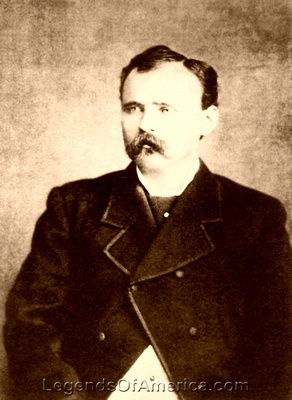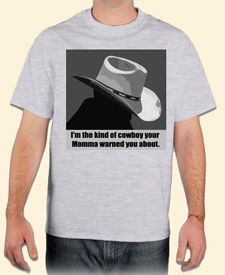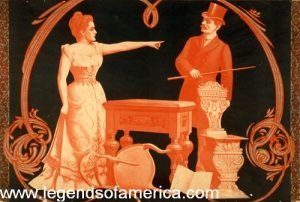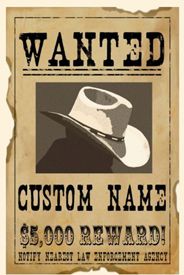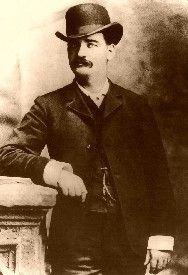By W.R. (Bat) Masterson in 1907
I have been asked to write something about the noted killers of men I am supposed to have personally known in the early days of the western frontier and who, of their number, I regarded as the most courageous and the most expert with the pistol.
In making this request, I may reasonably assume the editor did not consider that he was imposing on me very much of a task and had it embodied nothing more than the question of proficiency with the pistol, such would have been the case, but in asking me to offer an opinion on the question of physical courage as sometimes exemplified by them under nerve trying conditions, he has placed a responsibility on my shoulders that I hardly care to assume. I have known so many courageous men in that vast territory lying west and southwest of the Missouri River — men who would, when called upon, face death with utter indifference as to consequences that it would be manifestly unjust for me even to attempt to draw a comparison.
Courage to step out and fight to the death with a pistol is but one of three qualities a man must possess to last very long in this hazardous business. A man may possess the greatest amount of courage possible and still be a pathetic failure as a “gunfighter,” as men are often called in the West who have gained reputations as “man-killers.”
Courage is of little use to a man who seeks to arbitrate a difference with the pistol if he is inexperienced in using the weapon he will use. Then again, he may possess courage and experience and fail if he lacks deliberation.
Any man who does not possess courage, proficiency in the use of firearms, and deliberation had better make up his mind at the beginning to settle his personal differences in some other manner than by appealing the pistol. I have known men in the West whose courage could not be questioned and whose proficiency with the pistol was simply marvelous, who fell easy victims before men who added deliberation to the other two qualities. I will cite a few such instances that came under my observation.
Thirty-five years ago, Charlie Harrison was one of the best-known sporting men west of the Missouri River. His home was in St. Louis, but he traveled extensively throughout the West and was well-known through the Rocky Mountain region. He was of an impetuous temperament, quick of action, of unquestioned courage, and the most expert man I ever saw with a pistol. He could shoot faster and straighter when shooting at a target than any man I ever knew; then add to that the fact that no man possessed more courage than he did, and the natural conclusion would be that he would be a most formidable foe to encounter in a pistol duel.
In 1876, he started for the Black Hills, which had a great mining boom because of the discovery of gold at Deadwood. When Charley reached Cheyenne, he became involved in a personal difficulty with another gambler named Jim Levy, and both men started for their respective lodgings to get their pistols and have it out the first time they met. It looked like 100 to 1 that Harrison would win the fight because of his well-known courage and proficiency in pistol use. Little was known at that time about Jim Levy, but Harrison was made a hot favorite in the betting field at the various gambling resorts in Cheyenne. The men were not long in getting together after securing their revolvers, which were of the Colt’s pattern and 45 caliber in size.
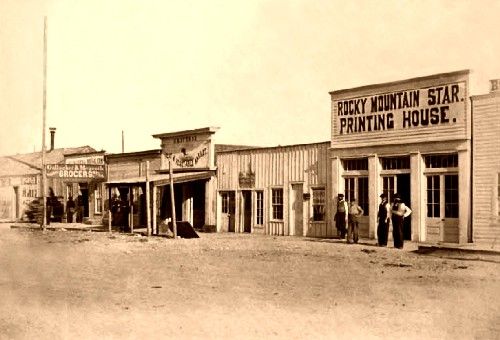
Cheyenne, Wyoming, 1868.
They met on opposite sides of the city’s principal street and opened fire on each other without a moment’s delay. Harrison, as was expected, fairly set his pistol on fire; he was shooting so fast and managed to fire five shots at Levy before the latter could draw a bead on him. Levy finally let go of a shot. It was all that was necessary. Harrison tumbled into the street in a dying condition and was soon afterward laid to rest alongside others who had gone before in a similar way.
That Harrison was as game a man as Levy could not be doubted; that he could shoot much faster, he had given ample proof, but under extraordinary conditions, he had shown that he lacked deliberation and lost his life in consequence. The trouble with Charley Harrison was just this-he was too anxious. He wanted to shoot too fast. Levy took his time. He looked through the sights on his pistol, which is essential when shooting at an adversary who is returning your fire.
Johnny Sherman, another well-known Western sport and a near relative of the famous Sherman family of Ohio, was another remarkably fine pistol shot.
When he happened to be where he could not go out and practice with his pistol, he would hunt up a shooting gallery and spend an hour or so practicing with the gallery pistols.
Wanted to Shoot Too Fast
In this way, he became adept in the use of the revolver. He was, as everyone who knew him can testify to, as courageous as a lion, and yet, when he started in to kill a dentist in a room in a St. Louis hotel, who had, as he claimed, insulted his wife, he emptied his pistol at the dentist without as much as puncturing his clothes, and mind you, the dentist was not returning his fire. Like Harrison, Sherman was in too big a hurry to finish the job and forgot that there was a set of sights on his pistol.
Levi Richardson is another case in point that will show that coolness and deliberation are essential qualities in a shooting scrape. Unless a man possesses them, he is very apt to fall victim to the man who does. Levi Richardson had been a buffalo hunter with me on the plains of western Kansas for several years. We were very close friends and shared our blankets on many cold winter nights when blankets were a very useful commodity. He was thoroughly familiar with firearms and an excellent shot with either pistol or rifle. He was a high-strung fellow who was not afraid of any man. He got a notion into his head one night in Dodge City, Kansas, that a young gambler by the name of Frank Loving, generally known as “Cock-eyed Frank,” had done him some wrong and forthwith made up his mind to kill him on sight. He publicly declared what he intended to do to Loving as soon as he met him, and some busybody listening to the threats hastened away to put Loving on his guard.
Frank Loving was a mere boy then, but he was not afraid. He immediately proceeded to arm himself and be prepared to deal with the best he had when his man came. He did not have to wait very long, for Richardson was a man to act promptly when once he had made up his mind to do a certain thing, and as he had decided on killing Loving with as little delay as possible, the battle was on almost before a person had time to think. Richardson found Loving sitting unconcernedly on a card table in the Long Branch Saloon and instantly opened fire on him with his Colts 45 caliber pistol. He fired five times at his man in rapid succession but missed with every shot and was finally shot dead by Loving, who took his time with his work. It was the cleanest possible shot.
Like Harrison and Sherman, Richardson did not take sufficient time to see what he was doing, and his life paid the penalty. No one, however, who knows both men could truthfully say that Loving possessed a greater degree of courage than Richardson or that, under ordinary conditions, he was a better marksman with a gun. He had the best nerve, a quality quite different from courage. Courage, generally speaking, is daring.
Nerve is Steadiness
I was the sheriff of the county at the time and refused to lock Loving up in jail, holding that he had, in killing Richardson, only acted in self-defense, and permitted him to be at large on his own recognizance until his preliminary examination was held, which exonerated him, as I knew it would. I have never stood for murder and never will, but I firmly believe that a man who kills another in defense of his own life should always be held blameless and will always lend a helping hand to such a man.
Frank Loving was himself murdered three years later by another gambler by the name of John Allen in Trinidad, Colorado. Allen, soon after his acquittal for the murder of Loving, became a street preacher, and of course, all has been forgiven.
The Career of Ben Thompson
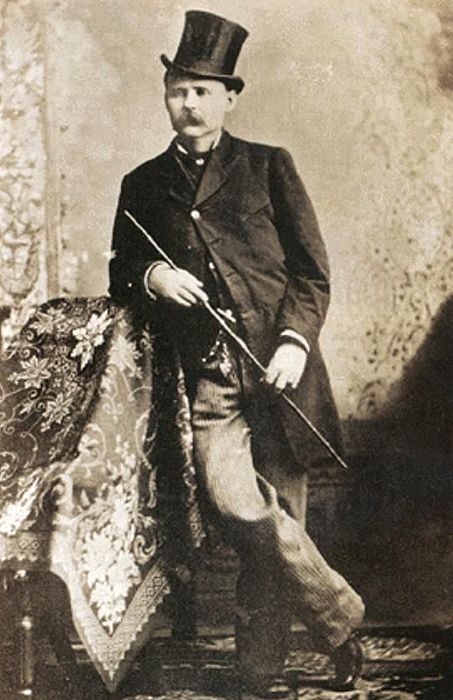
Ben Thompson Gunfighter.
But all this is preliminary to the real purpose of this story, which is to tell something about Ben Thompson, the famous “gunfighter” of Austin, Texas. Ben Thompson was born in England and came to this country with his family when he was a boy. The family settled in Austin, Texas, and Ben learned the printer’s trade and set type in the city’s newspaper offices.
When the Civil War broke out, he enlisted as a private in one of the Texas regiments and went to the front to fight the battles of the lost cause. He was only a boy in years when he enlisted, but he was not long in showing the kind of mgritin him. While serving in General Kirby Smith’s command during the campaign along the Red River, young Thompson performed many deeds of great daring, such as crossing the enemy’s lines and carrying important dispatches for the officers of his command.
For the dash and courage he displayed at the battle of Sabine Cross Roads, just above the mouth of the Red River in Louisiana, his commanding officer promoted him to the rank of captain. After hostilities between the North and South, Ben returned to his home in Austin but did not remain long. The spirit of war was now upon him, and he longed for more conflict.
Austin was too peacefully disposed of for him, so he immediately set out for old Mexico, where Maximilian was having a lively time maintaining himself as Emperor of Mexico. After getting on Mexican soil, Ben lost no time reaching Maximilian’s army headquarters, where he tendered his services on behalf of the invader’s cause. He was instantly accepted and commissioned a captain, and he soon wore the uniform of the Emperor’s army. Ben, however, was not given much opportunity to achieve distinction in the invading army, for Maximilian soon after suffering a collapse. Thompson was lucky to get away from the Mexicans and reach his home in Austin with his life.
Ben Thompson was a remarkable man in many ways, and it is very doubtful if, in his time, another man was living who equaled him with the pistol in a life-and-death struggle. In the first place, Thompson possessed a much higher order of intelligence than the average “gunfighter” or man-killer of his time.
He was more resourceful and a better general under trying conditions than any of that great army of desperate men who flourished on our frontier thirty years ago. He was absolutely without fear, and his nerves were those of the finest steel. He shot at an adversary with the same precision and deliberation as a target. He was a past master in using the pistol, and his aim was as true as his nerves were strong and steady. He had during his career more deadly encounters with the pistol than any man living and won out in every single instance. The very name of Ben Thompson was enough to cause the general run of “man killers,” even those who had never seen him, to seek safety in instant flight. Thompson killed many men during his career, but always in an open and manly way. He scorned the man who was known to have committed murder and looked with contempt at the man who sought unfair advantages in a fight.
The men whom he shot and killed were, without exception, men who had tried to kill him, and an unarmed man, or one who was known to be a non-combatant, was far safer in his company than he would be right here on Broadway at this time. He was what could be properly termed a thoroughly game man and, like all men of that sort, never committed murder. He stood about five feet nine inches in height and weighed, in later years, in the neighborhood of 180 pounds.
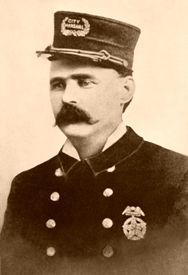
Ben Thompson.
Wore Silk Hat and Prince Albert
His face was pleasant to look upon, and his head was round and well-shaped. He was what could be called a handsome man. He was always neat in his dress but never loud and wore little if any, jewelry at any time. He was often seen on the streets of Austin, especially on a Sunday, wearing a silk hat and dressed in a Prince Albert suit of the finest material. While he was not given to taking any unnecessary chances with his life, he would unhesitatingly do so if he felt that occasion demanded it. For example:
One day, he had a falling out with the proprietor of a vaudeville house in Austin. That night, just at the busiest hour, he went over to the place and fired a shot from his pistol into one of the big chandeliers hanging from the ceiling. This broke some of the glass shades and scattered the pieces of broken glass in all directions over the audience.
As might be expected, this caused an immediate stampede of patrons who rushed pell-mell for the street. When things quieted down somewhat, Thompson left the place without offering to do any further mischief. That seemed to satisfy Ben, and in all probability, the trouble would have ended then, and there had the proprietor let the matter rest where it was. Still, he refused to listen to the advice of his friends and openly declared that he intended to get even with Thompson. As a matter of course, everything he said about Ben was instantly carried to him, and, as is generally the case in such cases, some things he did not say were added to the story by the tale-bearers.
The Threat of the Vaudeville Man
At any rate, it got noised about town that the Vaudeville man was thoroughly organized for Ben and intended to kill him the first time he ever stepped inside his house. Of course, Ben was told what was being said about him by the hurdy-gurdy manager, but he only laughed and said that he guessed if he didn’t die until he got killed by the showman, he would live a long time. But reports of the threats that were being made against his life by the vaudeville proprietor kept reaching him with such regularity that he finally began to think that perhaps there might be something in them. At any rate, he decided to see for himself how much there really was in those threats he had heard about for so long. So one night, while the show was in full blast, he told a very warm personal friend of his by the name of Zeno Hemphill that he had made up his mind to go over to the show and look over the arrangements he understood had been made for his removal from this vale of tears.
“Zeno,” said Ben’ ‘just fall in a few feet behind me and holler if you see anything that doesn’t look exactly right to you when I get inside that ‘Honkytonk.’ “Remember, Zeno, I only want you along for a witness in case anything happens,” remarked Ben as he crossed the street to the variety theater that was soon to witness a terrible tragedy within its walls. Ben entered a door that led to the bar room from the street. This bar room was a part of the theater, although the stage upon which the performance appeared was in another part of the building.
To reach that part of the building in which a performance was being given, Ben needed to pass along the entire length of the bar, then through a pair of swinging doors located about ten feet further on, through which it was necessary to pass before a view of the stage could be obtained. When Ben first entered the bar room, he took a hasty survey of the surroundings but saw nothing that caused an alarm. In fact, he did not expect the attack to come from that part of the house, if indeed an attack was made at all, but was looking for it to occur after he had reached the theatre proper, which would not be until after he had passed the swinging doors.
Ben did not stop in the bar room but kept strolling towards the swinging doors, and just as he was about to push them apart, he heard Zeno, who had just then stepped into the room, cry out, “Look out, Ben.” But before Ben could scarcely move, the bartender, whose name was Mark Wilson, had raised a double-barreled shotgun that he had lying along the mixing board back of the bar and emptied both barrels, which were heavily loaded with buckshot, at Ben, who could not have been more than ten feet away.
Incredible as it may seem, Thompson escaped without a scratch. Mark Wilson, the bartender, was known to be a courageous young fellow who had shown considerable fighting grit on several occasions. For that reason, he had been selected to kill Thompson the first time he entered the place. Wilson, however, realizing that he was taking upon himself something of a job in agreeing to dispose of Ben Thompson, concluded that it would be best to get a little help, so he went to his friend Sam Mathews and told him what he had made up his mind to do and asked him if he would help him out in the matter.
“With great pleasure,” replied Mathews. He immediately went for his trusty Winchester rifle and immediately repaired to the variety theatre to help his friend Wilson put Ben Thompson out of the way.
When Ben entered the bar room that evening, he saw Mathews standing around the corner of the bar but did not notice that he had a Winchester rifle leaning by his side; in fact, he did not regard Mathews, whom he knew pretty well, as an enemy and perhaps for that reason did not look him over very carefully. But to get to the point. The smoke from the shotgun had scarcely blown aside before Ben had whipped out his pistol and, like a flash of lightning, had shot Wilson dead in his tracks. Ben then ‘noticed that Mathews had a Winchester rifle in his hand and instantly concluded that he, too, was there to aid Wilson in killing him. Mathews seemed to anticipate what was passing through Thompson’s mind, for he ducked behind the bar instead of attempting to use the rifle. Thompson, instead of going around the end of the bar where he could see Mathews, took a rough guess at his location and fired through the end of the bar. The bullet struck Mathews squarely in the mouth and toppled him over on the floor.
When Case Was Called for Trial
Ben then turned around and walked out of the place with his friend, Zeno Hemphill, who later, when the case was called for trial, was the most important witness for the defense. Ben was kept locked up in jail pending the preliminary examination, admitted to bail, and subsequently acquitted.
This is only one of a dozen such occurrences that could be cited in the career of this most remarkable man. Wilson and Mathews were unquestionably men of courage, else they could not have been induced to enter into a plot to kill such a desperate man as they knew Thompson to be; but when it came to the scratch, they both lost their nerve and Ben was privileged to add two more names to the list of ambitious “gunfighters,” who had sought to take his life. Thompson served a term as chief of police of the city of Austin, and all the old-time citizens of the place remember him still as the best chief of police the city ever had. While Thompson was known throughout all that vast territory lying west and southwest of the Missouri River as the nerviest of men and as unerring a shot with a pistol as ever lived, there were several men contemporaneous with himself who had the occasion arisen, would have given him battle to the death.
All with Nerves of Steel
Such men as “Wild Bill” Hickok, Wyatt Earp, Billy Tilghman, Charley Bassett, Luke Short, Clay Allison, Joe Lowe, and Jim Curry were all men with nerves of steel which had often been put to the test — anyone of whom would not have hesitated a moment to put up his life as the stake to be played for. Those men lived and played their part and played it exceeding well on the lurid edge of our Western frontier at the time Ben Thompson was playing him. It is safe to assume that none of them would have declined the gage of battle with him had he flung it down to any of their numbers.
In making this admission, however, I am constrained to say that little doubt exists in my mind but that Thompson would have been returned the contest winner. Ben Thompson was murdered along with his personal friend, King Fisher, in a vaudeville theatre in San Antonio, Texas, on March 11, 1884.
Both he and King Fisher were killed from ambush by several persons who were concealed in the wings of the stage, and neither ever knew what happened. Ben was hit eight times by bullets fired from a Winchester rifle, and King Fisher was hit five times. All the shots were fired simultaneously, and both sank to the floor dead as it is possible ever to be. It was a cold-blooded, cruel, and premeditated murder for which no one was ever punished by law.
W.R. (Bat) Masterson,1907 – Compiled and edited by Kathy Alexander/Legends of America, updated April 2024.
About the Author and Notes: Though most of us know that W.B. “Bat” Masterson was famous as a gunfighter and friend of such characters as Wyatt Earp, Doc Holliday, and Luke Short, many may not know he was also a writer. After his many escapades in the American West, he accepted the post of U.S. Marshal in New York State. However, by 1891 he was a sports editor for a New York City newspaper. In 1907 and 1908, he wrote a series of articles for the short-lived Boston magazine Human Life. This tale of Ben Thompson was just one of several of those articles. Masterson died in 1921 of a heart attack. The article on these pages is not verbatim, as it has been very briefly edited, primarily for spelling and grammatical corrections.
Also See:
Bat Masterson – King of the Gun Players
Complete List of Old West Gunfighters

